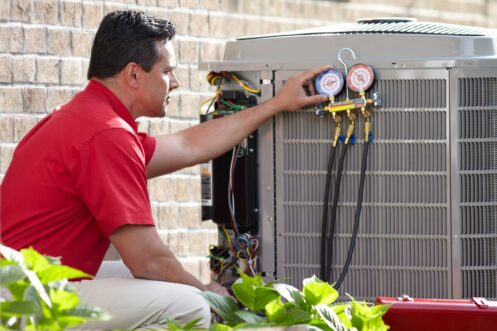
When working properly, your AC should be able to easily keep your home fully cool on even the hottest days. An AC that won’t turn on or can’t keep your home cool is an obvious sign that the system needs to be repaired. It is also important that you watch out for these other issues as they are also good indicators that your AC needs to be repaired.
1. Screeching, Grinding, Rattling or Other Unusual Noises
Your air conditioning will always make some noise when it’s on. However, loud or unusual noises, whenever your AC is running, is usually a sure sign that the system needs some type of AC repair.
For instance, you may hear a loud screeching or squealing noise coming from either the outdoor AC unit or from the blower fan inside your home. If the noise is coming from the outdoor unit, it indicates that there is a problem with the unit’s fan motor. Most newer AC units have a direct-drive fan motor, which has internal bearings that allow it to spin. In this case, the screeching or squealing noise usually indicates that the bearings are worn out and need to be replaced. If your AC unit is much older, the fan motor is likely belt-driven. If you hear screeching or squealing coming from a belt-driven motor, it indicates that the fan belt is either worn out or misaligned. If you hear a screeching or squealing coming from the blower inside the home, it also typically means that either the bearings need replaced or the fan belt needs adjusted or replaced depending on whether the motor is belt-driven or direct-drive.
Your AC could also make a loud grinding noise that sounds like metal scraping against metal. If the noise is coming from the outdoor unit, it typically means that either the fan assembly is loose or one of the fan blades is misaligned. Both of these issues can cause the fan to scrape against the side of the unit and produce a loud grinding sound. Similarly, if the noise is coming from inside the home, it typically means that the blower is loose or misaligned and scraping against its housing.
Rattling noises coming from the outdoor AC unit often indicate that some component is loose and needs to be tightened or replaced. Another possibility is that one or more of the rubber isolation feet that the unit sits on has started to wear out. When this happens, the unit can become unbalanced and start to vibrate and make a loud rattling sound whenever it is running.
A humming noise coming from the outdoor unit is often a sign of a much more serious problem as it usually indicates that there is an issue with the AC compressor motor. This type of noise is definitely not something you want to ignore as it could lead to the compressor motor burning out if you continue to run your AC without having it inspected and the issue repaired.
You may also hear either the outdoor AC unit or the blower make a repeated clicking noise when it tries to start. If you hear this noise and the AC unit or blower won’t run, it indicates that the unit’s start capacitor has failed and needs to be replaced. The start capacitor stores a powerful electrical charge that it releases to essentially kick start the AC fan and compressor motor or the blower motor. If the capacitor fails, the unit typically won’t have enough power to start. A failed capacitor will almost always produce an audible clicking noise when the unit tries to run. You may also hear the motor make a humming sound along with the clicking noise, and this humming is a result of the motor trying to start on its own without the additional power supplied by the start capacitor.
A hissing or bubbling sound when your AC is running is also a serious problem you will want to have checked out immediately. In this case, it typically indicates that there is a refrigerant leak somewhere in the system.
2. AC Is Short Cycling
Short cycling is when an AC system turns on and then shuts back down before it completes a full cooling cycle, i.e. before it has fully cooled the home to whatever temperature the thermostat is set to. Even on mild days, it should still take your AC at least 15 minutes to complete a full cycle. If the unit only ever runs for five or 10 minutes, it is an obvious sign that something is preventing it from working correctly. When a unit is short cycling, it will also typically only stay off for a few minutes before turning back on again.
Short cycling is a serious problem as constantly turning on and off puts a lot of additional strain on the AC unit and will contribute to increased wear and tear on all of its components. If the unit continually short cycles, it can also drastically shorten its lifespan. Short cycling will also contribute to much higher energy costs. All AC units use around three to five times more energy when first starting up than they do when running. If the unit constantly cycles on and off multiple times in an hour, it will use far more energy than it would if it completed two or three full cycles in an hour as it should when working correctly.
Short cycling can result from a variety of different issues. One possibility is that the unit is oversized and too powerful for the home. An oversized AC will typically always short cycle, which means it will use much more energy and not cool as effectively as a properly sized unit. Unfortunately, the only solution to this problem is to have the unit replaced with an AC that is the proper size for your home.
Short cycling can also occur due to electrical issues such as frayed or damaged wiring or loose electrical connections. An AC can also short cycle due to overheating, as the unit will always shut down if it overheats to prevent possible damage to the compressor motor and other components. The only way to know for sure why your unit is short cycling is to have an AC technician fully inspect it.
3. AC Runs Continuously
If you turn your AC on when the temperature inside your home is more than 5 degrees higher than the thermostat setting, the unit may take up to an hour to complete a full cycle and cool the home to the desired temperature. However, your AC still should never run continuously for hours at a time. If the unit does start to run for much longer periods, you should first replace the air filter. A dirty air filter will restrict how much warm air can be drawn into the system and drastically reduce the rate of cooling.
If replacing the air filter doesn’t solve the problem, you’ll want to have your entire AC system inspected as soon as possible. This problem could mean that the blower motor is beginning to wear out or has some other issue that is preventing it from circulating enough air. Another possibility is that there are major leaks in the ductwork, which can also limit the blower’s ability to circulate sufficient air. The outdoor unit may also be overly dirty or clogged with debris, as this can prevent the unit from dispersing heat properly and lead to the refrigerant temperature staying too high for the system to cool effectively.
At Beltway Air Conditioning & Heating, we work on all AC makes and models and our team can help you overcome most all AC issues. We specialize in HVAC repairs and maintenance as well as air conditioning and heating installations, and we can also help if you need any heating, ductwork or indoor air quality services in the Hanover area. Give us a call today if you need AC repairs or if you have any questions.


